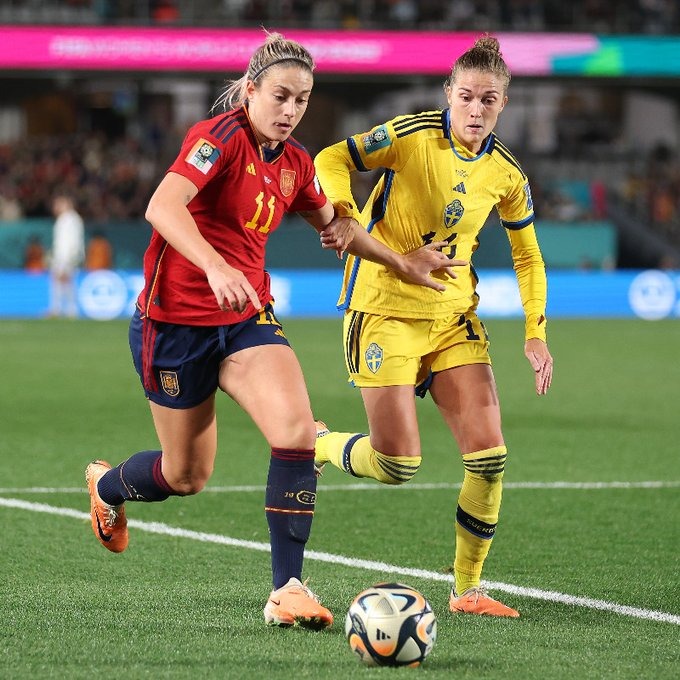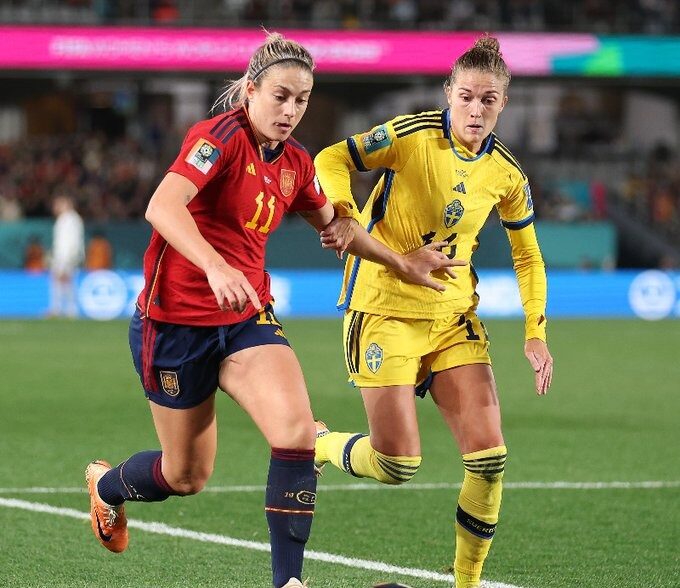
If a star was born in Spain’s Women’s World Cup quarterfinal against the Netherlands, it reached its zenith in the semi-final against Sweden, with Salma Paralluelo, the 19-year-old Barcelona star, scoring the opening goal and changing the tide as Jorge Vilda’s side booked their place in Sunday’s final. Spain, who had never gone past the round of 16 in their two previous World Cup appearances, will now face either Australia, the co-hosts, or England.
Paralluelo’s goal had come in the 81st minute, and Spain, as they had in the game against Netherlands, were guilty of switching off. There were just over two minutes of normal time remaining at Eden Park in Auckland when a left-wing cross was nodded back into the danger area, and Rebecka Blomqvist, the VFL Wolfsburg forward, was left unmarked and in acres of space to lash home.
Blomqvist had also come on as a substitute, replacing Arsenal’s Stina Blackstenius, who had run herself into the ground as the lone forward. The Swedish bench celebrated the lifeline fervently, but they had barely retaken their seats when their semi-final jinx struck again. Olga Carmona, the Real Madrid left-back, had tried her luck from distance twice earlier. This time, from the edge of the box, she went for placement with the instep rather than sheer power. Zecira Musovic in the Swedish goal, whose heroics had helped her team past both the USA and Japan, had no chance as the ball looped over her and in off the bar. It was a strike worthy of winning any game of football, anywhere in the world, and this time, Spain showed enough composure to hold on. For Sweden, this was a third semi-final defeat since 2011.
For the first time in the tournament, Spain had started with Alexia Putellas, their best player and winner of the Women’s Ballon d’Or in 2021 and 2022. But Putellas has been well short of her best since suffering an ACL injury in July 2022, and she was a peripheral figure in the first half. Spain bossed possession, as expected, but created few clearcut chances. Putellas was seldom seen breaking into the box, and Spain came closest to opening the storing when a Carmona piledriver whistled just inches past the post.
Mariona Caldentey made plenty of runs down the left channel, but the quality of Spain’s final pass wasn’t there. Aitana Bonmati was almost as disappointing as Putellas, misplacing passes and getting caught in possession. Sweden didn’t show much ambition, but always looked a threat at set pieces. Kosovare Asllani, their veteran attacking midfielder, tried to initiative some incisive moves, but in general, Cata Coll in the Spanish goal had little to do.
Ten minutes into the second half, Vilda decided he had seen enough. Paralluelo was sent on in place of Putellas, and her impact was immediate. Her pace and physicality visibly rattled Sweden, and they barely saw the ball in the 15 minutes that followed. The goal when it came was once again all about opportunism, with Paralluelo reacting quickest to a penalty-box melee, and arrowing a shot into the far corner.
This time, it wasn’t the winner, but Carmona’s late intervention ensured that Spain wouldn’t have to endure another period of extra time. Just over a fortnight ago, in Wellington, a 4-0 thrashing at the hands of Japan appeared to have stopped Spain’s campaign in its tracks. But the manner in which they have rebounded since has been straight out of a movie script. Only the climax remains now.




